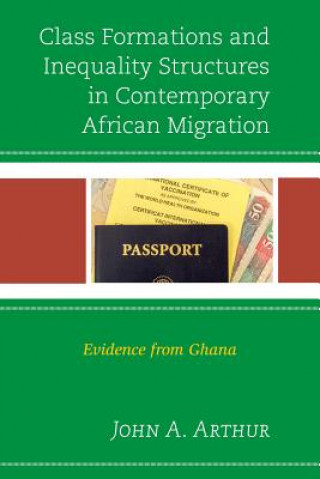
Kód: 05140939
Class Formations and Inequality Structures in Contemporary African Migration
Autor John A. Arthur
This book examines the influences of social class and inequality structures on migration in Africa using information from Ghana. As the country achieves moderate to significant economic gains driven (in part) by the country's dias ... celý popis
- Jazyk:
 Angličtina
Angličtina - Vazba: Pevná
- Počet stran: 296
Nakladatelství: Lexington Books, 2014
- Více informací o knize

Mohlo by se vám také líbit
-

Late Marxism
501 Kč
Darujte tuto knihu ještě dnes
- Objednejte knihu a zvolte Zaslat jako dárek.
- Obratem obdržíte darovací poukaz na knihu, který můžete ihned předat obdarovanému.
- Knihu zašleme na adresu obdarovaného, o nic se nestaráte.
Více informací o knize Class Formations and Inequality Structures in Contemporary African Migration
Nákupem získáte 438 bodů
 Anotace knihy
Anotace knihy
This book examines the influences of social class and inequality structures on migration in Africa using information from Ghana. As the country achieves moderate to significant economic gains driven (in part) by the country's diaspora communities, the desire to migrate has intensified. Migration is now synonymous with social mobility and self-improvement. It has been found that existing class and status inequalities are analytically inseparable from the social and cultural processes underpinning the motivations behind Ghanaian migration. Migrant class and socioeconomic attributes are closely intertwined, reinforcing and operating at every level of the migration decision-making to influence the motivation to migrate, the type and form of migration, the direction of the migration, its timing, and ultimately the outcomes and expectations that migrants associate with their decision to migrate. From a historical and contemporary perspective, this book argues that power and class-based structural relationships are significant components in understanding how migratory diasporas shape and are shaped in turn by social class and inequality. The social class identities that Ghanaian immigrants manifest in the United States are often based on immigrant formulations and importation of class dynamics from the home country. These identities are then transformed in the countries of destination and replayed or relived back home, thereby creating multiple class identities that are powerful forces in inducing social changes. In essence, migrant social class attributes formed before and post-migration is significant because it holds the possibilities of transforming the social structures of migrant-sending countries. As migrants return home and seek reintegration into the body polity of the home society, conflicts emanating from changes in their class dynamics may hinder or promote sociocultural and economic development. Hence, the imperative of the central government is to understand and incorporate into national development planning the social class characteristics of its citizens who are leaving, as well as those who are returning.
 Parametry knihy
Parametry knihy
Zařazení knihy Knihy v angličtině Society & social sciences Society & culture: general Social issues & processes
4381 Kč
- Plný název: Class Formations and Inequality Structures in Contemporary African Migration
- Podnázev: Evidence from Ghana
- Autor: John A. Arthur
- Jazyk:
 Angličtina
Angličtina - Vazba: Pevná
- Počet stran: 296
- EAN: 9781498503839
- ISBN: 1498503837
- ID: 05140939
- Nakladatelství: Lexington Books
- Hmotnost: 612 g
- Rozměry: 236 × 157 × 24 mm
- Datum vydání: 15. October 2014
Oblíbené z jiného soudku
-

The Second Sex
213 Kč -

White Tears Brown Scars
302 Kč -

When Helping Hurts
345 Kč -

The Beauty Myth
181 Kč -

Violence and the Sacred
887 Kč -

Wolf Nation
794 Kč -

Good Immigrant
334 Kč -

Stuart
302 Kč -

Population Wars
409 Kč -

The Lucifer Effect
454 Kč -

Superforecasting
323 Kč -

Sensate Focus in Sex Therapy
1021 Kč -

Pleasure Activism
421 Kč -

Drama Of Being A Child
276 Kč -

Alcoholics Anonymous Big Book
602 Kč -

Vulture
431 Kč -

Regarding the Pain of Others
302 Kč -

Rational Optimist
419 Kč -

Poor Economics
323 Kč -

Violence
323 Kč -

Psychopath Free
421 Kč -

Shock Doctrine
433 Kč -

The Divide
323 Kč -

Silently Seduced
323 Kč -

The Feminine Mystique
290 Kč -

Toxic Parents
356 Kč -

Soft Power
362 Kč -

Third Wave
257 Kč -

Posthuman Feminism
569 Kč -

No Logo
323 Kč -

Courage To Heal Workbook
784 Kč -

Illness as Metaphor and AIDS and Its Metaphors
356 Kč -

Down and Out in Paris and London
249 Kč -

Dopesick
213 Kč -

Presence
381 Kč -

Facing the Shadow
812 Kč -

Last Days at Hot Slit - The Radical Feminism of Andrea Dworkin
470 Kč -

A Room of One's Own
236 Kč -

Future Shock
270 Kč -

Problem that Has No Name
63 Kč -

Your Silence Will Not Protect You
383 Kč -

Social Animal
378 Kč -

Attention Merchants
334 Kč -

Who Cooked Adam Smith's Dinner?
302 Kč -

Stiff Upper Lip
302 Kč -

Power Elite
463 Kč -

Eternal Treblinka
500 Kč -

Critical Race Theory (Third Edition)
543 Kč -

Go Ask Alice
249 Kč
Osobní odběr Praha, Brno a 12903 dalších
Copyright ©2008-24 nejlevnejsi-knihy.cz Všechna práva vyhrazenaSoukromíCookies



 Vrácení do měsíce
Vrácení do měsíce 571 999 099 (8-15.30h)
571 999 099 (8-15.30h)